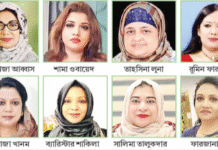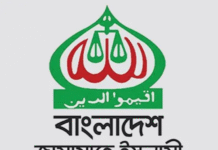Bangladesh has made significant progress in consolidating macroeconomic stability under the ECF-supported program,” says Rodrigo Cubero, who led a mission of the International Monetary Fund (IMF) mission to Dhaka.
The mission was in Dhaka between 17-30 Sept to review the three-year Extended Credit Facility (ECF) arrangement.
The ECF was approved on April 11, 2012 for a total amount of SDR 639.96 million (equivalent to about US $954 million).
“Despite a moderation in exports, foreign exchange reserves have continued to increase and have reached adequate levels, inflation has declined, the fiscal deficit is contained and public debt is on a downward path.”
Cubero pointed out that the country’s economy would have done better with a ‘calmer political environment’.

“But economic activity is gaining momentum, and real GDP growth is expected at about 6¼ percent in fiscal year (FY) 15 (July 2014-June 2015), supported by strong domestic demand. There has also been progress on structural reforms,” Cubero said in a statement at the end of the visit.
But he expressed angst at the delay in the introduction of a new value added tax (VAT), which he described as ‘a key government reform to boost fiscal space for development spending’.
“To ensure sustained rapid growth and poverty reduction in the medium term, it is necessary to preserve macroeconomic stability and create fiscal space for critical infrastructure investment and well-targeted social spending. The persistent revenue shortfalls relative to budget expectations reinforce the importance of pressing ahead with tax reforms,” the Cubero statement said.
It said: “Implementing the new VAT remains the foremost priority, as it has the potential to mobilize considerable additional resources, reduce compliance costs, and boost growth. This should be complemented by reforms to strengthen revenue administration and automate data management and reporting procedures.”
“The mission welcomes the authorities’ efforts to strengthen public debt management by focusing external borrowing on projects with high social returns; to improve public financial management, including by formalizing monthly treasury cash flow forecasts; and to strengthen financial reporting by state-owned enterprises. The mission also looks forward to further decisive steps to improve the financial position of the state-owned commercial banks through enhanced supervision and corporate governance, complemented with gradual recapitalization as required.”
The statement said Bangladesh has made good progress in improving working and safety conditions in the garment industry.
“Further strengthening the targeting and efficiency of social safety net programs is, however, needed. Steps have also been taken to gradually liberalize foreign exchange regulations, helping to boost the investment climate. Continued progress on these fronts should contribute to promoting sustained high and inclusive growth.
“Preliminary understandings have been reached at the technical level on policy measures that, once endorsed by the Government and subject to approval by the IMF’s Executive Board, would permit concluding the fifth review under the ECF.”
The IMF mission met with the Minister of Finance, Minister of Commerce, Economic Adviser to the Prime Minister, Finance Secretary, Bangladesh Bank Governor, other senior officials, development partners and representatives of the private sector.
“We are appreciative of the constructive and open dialogue,” the statement said.
Source: Bd news24









